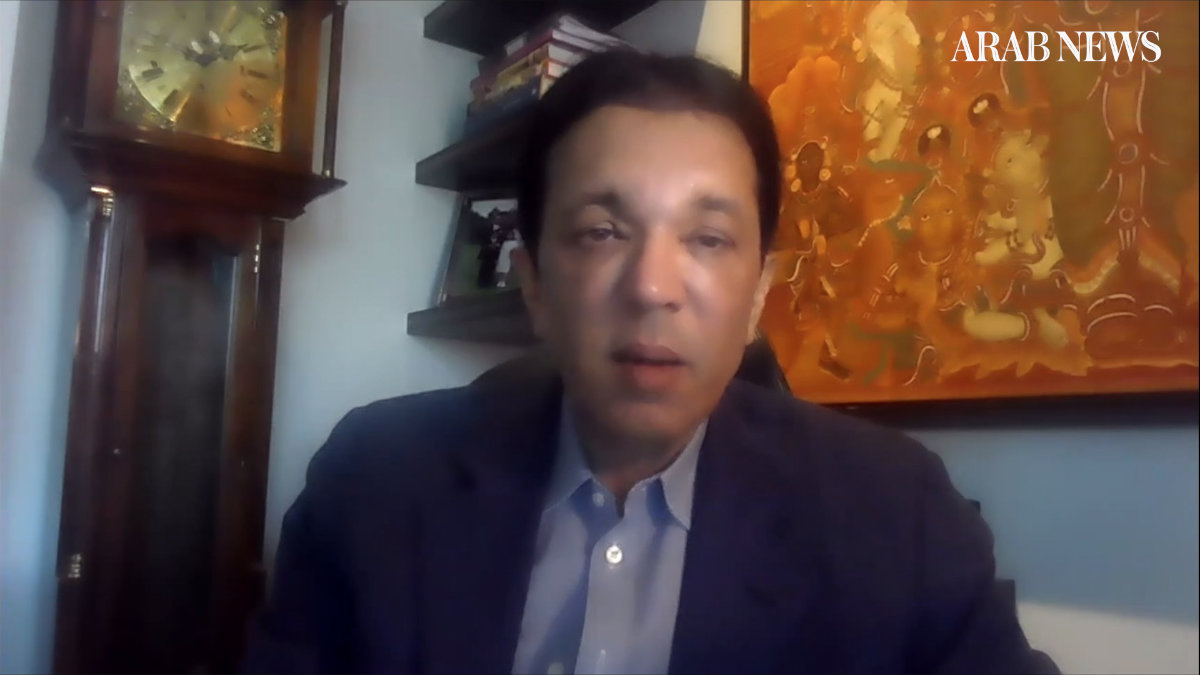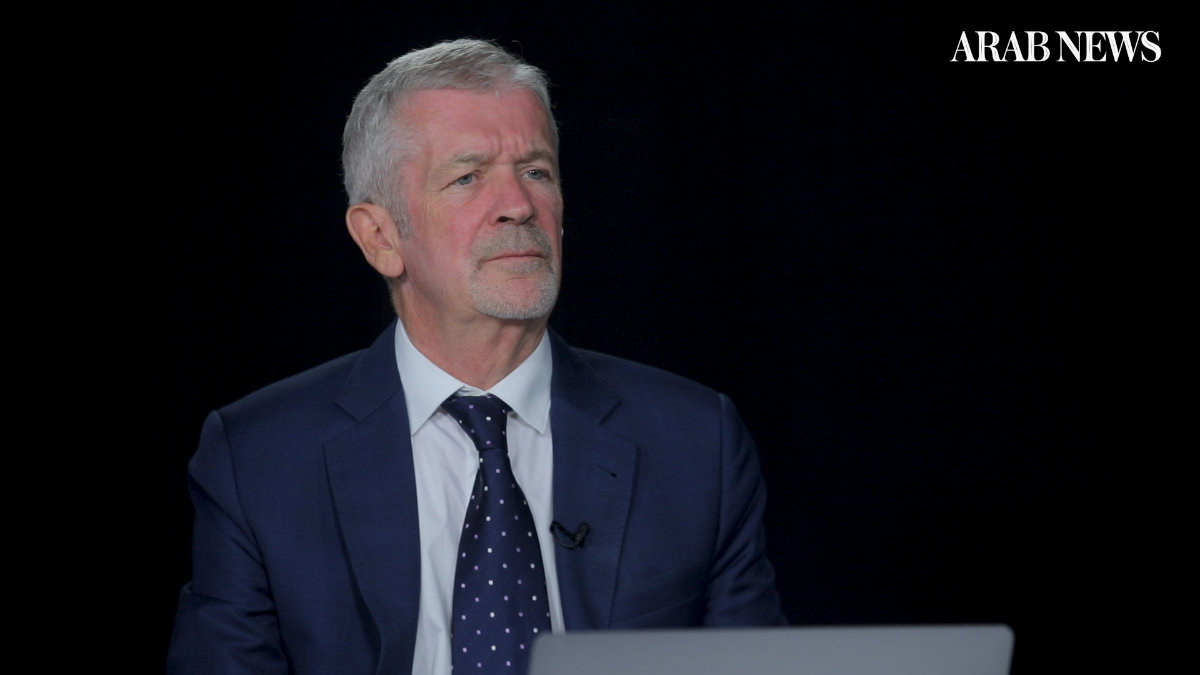DUBAI: More multibillion-dollar Vision Funds that will invest in high-technology startups around the world, including in Saudi Arabia, are being planned over the coming years.
Rajeev Misra, the chief executive of the business that currently oversees $130 billion of high-tech global investment, told Arab News that further funds are planned once the cash from Vision Fund 2 is fully invested. “There will be many Vision Funds over the next many decades,” he said.
Interviewed on Frankly Speaking, the series of video conversations with global decision-makers, Misra also revealed plans for the fund’s first investment in a Saudi company, its strategy to bring jobs and company start-ups to the Kingdom, and his desire to entice big Middle East investors back into the funds.
“We exist because of them. The Vision Fund is a joint effort by our two major partners — the Kingdom of Saudi Arabia and Mubadala of the UAE — and whenever they decide to join in the next one, we’ll be ecstatic,” he said.
Saudi Arabia’s Public Investment Fund was the biggest backer of the first Vision Fund, with a stake of $45 billion out of a total of roughly $100 billion, but both it and Mubadala declined to join Vision Fund 2, which launched with a $30 billion investment wallet backed by SoftBank of Japan.

Rajeev Misra
Once Vision Fund 2 is fully invested — roughly $20 billion has so far been spent — Misra and his team will look to other funds. “There will be Vision Fund 3, there will be Vision Fund 4. The important thing is to create an infrastructure of 450 employees in 11 offices who can continue the work for the next 10 or 12 or 20 years,” he said.
Misra’s confidence has been boosted by the big contribution he made to the profits of SoftBank of Japan recently. Legendary investor Masayoshi Son, founder and chief executive of the financial giant, reported the biggest ever profit by a Japanese company, $46 billion, with the bulk of that coming from Vision Fund gains.
Misra acknowledged that Vision Fund has benefited from the strong financial markets of the pandemic crisis, when governments intervened with big stimulus packages and technology stocks boomed because of new working and travel patterns.
“COVID-19 last year validated our vision and accelerated it dramatically. It would have happened anyway; it just accelerated (things) by a few years. The pandemic catalyzed the adoption of digital services. The markets helped. The buoyancy of the markets is important, but the companies have to do well. A bad investment even in a good market does not make you money,” Misra said.
The Vision Funds enjoyed a string of successful initial public offerings (IPOs), notably the multibillion-dollar profit it made on the public offering of South Korean e-commerce group Coupang in New York.
“We had several IPOs that had huge profits in the past five months. Coupang is an exciting outcome and it is an amazing story because we stuck with Coupang even when they were not doing well,” Misra said.
The investments by the PIF and Mubadala in 2018 were motivated partly by the desire for financial returns in the fast-growing technology sector, but also by the need to create jobs and attract corporate start-ups in the Middle East from Vision Fund portfolio companies.
Misra told Arab News that he was “on the cusp” of the fund’s first investment in a Saudi company — a messaging company — but he declined to give details until the company itself made the announcement. A deal could be announced in the course of the next week, he added.
“I believe we have created thousands of jobs from our portfolio companies in the region, whether it’s in construction, whether it’s in hospitality or technology. And we work very closely not just with the PIF but also with the Ministry of Investment in doing so. We are a four-year-old fund, so this will continue over the next many years,” he said.
Misra is a trustee of the King Abdullah University of Science and Technology (KAUST). “It is one of the top science universities in the world. There’s amazing talent in Saudi Arabia,” he said.
“There are limitless opportunities to invest across all sectors. It’s a 30 million population, it’s young, it’s growing. You have dynamic leadership. Riyadh has ambitious plans to become the business hub of the region.
“The recent announcement to attract the regional headquarters involved huge incentives that support relocation. I mean Riyadh was recently recognized in the top 15 most entrepreneurial cities. Globally I think it’s attracting tremendous foreign investments, including as I said from the Vision Fund, with our first investment in a local company.”
Misra was adamant that the fund’s basic strategy — of investing in early stage high-technology companies — was the right one, and dismissed any suggestion of a crash in the valuations of the technology sector.
“The technology revolution is just accelerating. Not just with your regular industries like e-commerce or food delivery, but it’s accelerating within life sciences. In major industries, what are the two biggest industries that impact our GDP? Healthcare and education,” he said.
“Over the next five years, hundreds of billions of dollars in value will be created in customized health care, in reducing the cost of health care, and in personalized medicine.
“Also in democratizing online education, where education is accessible and will fuel quality education online. You will have online high schools and colleges providing Ivy League education globally. We believe AI will transform every industry in the world.”
“Technology is going nowhere. Technology is like what the human DNA is to your daily existence — it is intertwined with you. Either you adopt it or the business goes bust.”
The Vision Fund suffered some high-profile governance issues in the past, notably the demise of the IPO of WeWork in 2019 and subsequent revelations about conflicts of interest involving the founders of the office-space company. Some critics said that they detected a “Wild West culture” at Vision Fund portfolio companies.
Misra disagreed with that label. “In Fund 1 we have 85 portfolio companies. In Fund 2 we have 70 or 80 companies. We take minority stakes in those companies. We don’t run those companies. We sit on the boards. We do keep an eye on them but we don’t day-to-day run those companies.
“But we did make some mistakes and we learnt from it. Since then, we have undergone a major turnaround and now we make sure there are no conflicts of interest with the founder.”

Frank Kane
On the current craze for special purpose acquisition companies (SPACs), which some have called “blank check” companies, he said that there were benefits from accelerating the progress toward a stock market listing, but pointed out that no Vision Fund portfolio companies had used the fund’s own SPAC to go public.
“The most important message here is for a company, once you go public, you have to be ready and you have to be prepared to go public. You have to understand that you have to get up every quarter and explain to the analysts and the shareholders how you have performed,” he said.
Misra was keen to pay tribute to Son, the SoftBank founder who is often described as a “visionary” in the world of high-tech investment. He recalled how Son invested billions in a small mobile phone operator in Japan in 2006, just before the smartphone was launched.
“He said, ‘Rajeev, you don’t understand. Computing is going to move to the hand from the desktop. People are not going to be working off their desktop anymore. They’re going to use phones to compute, and I see that over the next 10 years and I’m willing to take that bet.’
“This shows you the nature of his vision — he saw 10 years forward and was willing to take a $20 billion investment in a highly competitive market when the market cap of SoftBank was $9 billion.”
Misra added: “That was 15 years ago, and it all came true.”
_____________________
• Twitter: @frankanedubai



























